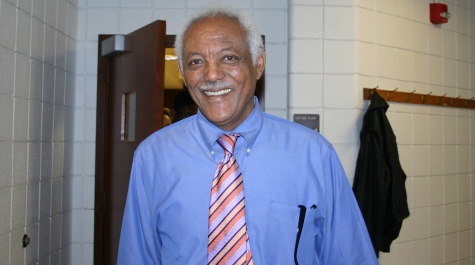Professor Alemante Selassie Retires from W&M Law School Faculty
Professor Alemante Selassie will retire this spring after 24 years of dedicated service to the law school community.
“Professor Selassie’s retirement from the law faculty is a real loss,” said Law School Dean Davison M. Douglas. “For almost a quarter century, Alemante has been a strong voice of wisdom and humanity at the law school. He has been a marvelous teacher and a very thoughtful scholar on issues of law in the developing world. He came to this country more than thirty years ago as a political refugee with $100 in his pocket. He retires from William & Mary Law School as a much beloved and respected colleague, and an important teacher of a generation of William & Mary law students. Fortunately for us, he will remain connected with our students and faculty after his retirement.”
Selassie earned his L.L.B. from Haile Selassie I University in Ethiopia, and then later received a J.D. and a M.L.I from the University of Wisconsin Law School. Before coming to the United States, he served as head of the Ethiopian Ministry of Land Reform.
Selassie is widely recognized for his scholarship on legal and constitutional reform in Africa. Two of his articles, “Ethnic Federalism: Its Promise and Pitfalls for Africa,” published in the Yale Journal of International Law, and “Ethnic Identity and Constitutional Design for Africa,” published in the Stanford Journal of International Law, have been particularly influential in shaping that continent’s constitutional development.
Among the courses Selassie has taught at the Law School are Contracts, Law & Development, Public International Law, and Secured Transactions. The graduating class of 2003 conferred on him the Walter L. Williams, Jr. Teaching Award, the Law School’s highest teaching honor. Both his students and faculty colleagues praise his commitment to the teaching enterprise – both inside and outside the classroom.
“Alemante Selassie is a remarkable person. With tremendous integrity and honesty, he always asks the important questions of all of us, difficult though they may be to answer,” says Paul Marcus, Haynes Professor of Law. “Professor Selassie is a person of great intellect and curiosity, an individual who is comfortable speaking about complex legal theory, or international relations, or good cooking. He has been my close friend for nearly 20 years; I have learned a great deal from him.”
“Alemante was always a great contributor in faculty colloquia,” says Jayne Barnard, Cutler Professor of Law and Kelly Professor of Teaching Excellence. “He never appeared disrespectful, but instead asked one very gentle question that often revealed the weakest point in the presenter’s paper. Alemante made us all raise our game.”
Selassie’s students appreciate his accessibility and commitment to their thorough understanding of the material. “I was impressed not only by his vast knowledge of the subject but also his dedication to his students and to the law school,” says Anne Andrews ’11. “He possesses a unique ability to present complex material in a clear and understandable manner. He was readily available outside of class to answer my questions, and I frequently attended his office hours.”
“Professor Selassie has inspired me to work harder and push myself,” says Laura Householder ’12. “I will never forget his dedication and wish him the best in his retirement.”
Other students remarked on his unique perspective of the law based on his background in international law and development. “I enjoyed Professor Selassie’s class in Public International Law tremendously because he offered an unbiased voice. He encouraged us to think beyond the western view. It was rewarding and significant for me as a law student to meet an intellectual whose background from Africa is somewhat parallel to mine,” says Maakor Quarmyne ’11.
“Professor Selassie has uniquely personal experience in international law,” added Mariel Murray ’12, “having worked for the Ethiopian Ministry of Land Reform before fleeing to Sudan and then France as a refugee before settling in the United States. I was honored to take Public International Law with him, where he strived to give students more than a Eurocentric perspective of international relations, sharing his informed opinions frankly while also facilitating fruitful class discussion. I have also spoken with him about self determination and the rights of indigenous peoples; he was consistently supportive of my research in these fields, and I am now completing an independent research paper based on our conversations. I look forward to his continued nurturing mentorship.”
Selassie’s ability to challenge students in the classroom left a lasting impression on Andrea Nixon ’12. “Selassie’s courses were worthwhile learning experiences because he doesn’t accept wrong answers. He does not strategically redirect any answer, whether right or wrong, to the next topic on his agenda. We didn’t simply read the cases to recite the facts; we read them to anticipate his questions and know the right answers. I think this is an invaluable skill that law schools should teach. And I can say that I learned it from Professor Selassie.”
Following his retirement, Selassie will continue to do some limited teaching at the law school. During the 2011-2012 academic year, he will teach Public International Law and Secured Transactions.
